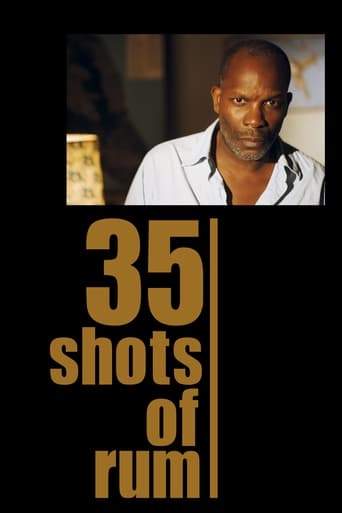Peereddi
I was totally surprised at how great this film.You could feel your paranoia rise as the film went on and as you gradually learned the details of the real situation.
Kidskycom
It's funny watching the elements come together in this complicated scam. On one hand, the set-up isn't quite as complex as it seems, but there's an easy sense of fun in every exchange.
StyleSk8r
At first rather annoying in its heavy emphasis on reenactments, this movie ultimately proves fascinating, simply because the complicated, highly dramatic tale it tells still almost defies belief.
InformationRap
This is one of the few movies I've ever seen where the whole audience broke into spontaneous, loud applause a third of the way in.
klaus_rieser
Contrary to another review here I found the film very enjoyable and interesting, although for the same reasons ;-) In my view, the film establishes the relationships among its central characters, in particular father (Lionel) and daughter (Josephine) through their actions, everyday behavior and their various looks (gazes, glances, observations). The way I read it (but the beauty of the film is in part that multiple readings are possible) it is mostly about the letting go of father and daughter, a musing on the "Father of the Bride" theme; in total contrast of course to the comedies of that title.Indeed the film has hardly any plot but interior developments; hardly any action, but a lot of movement; hardly fun but great possibilities of enjoyment.
Pan32
35 Shots of Rum (35 Rhums), Claire Denis, 2008, continues Denis' portrayal of Europeans of African ancestry with this quietly unfolding parable of a daughters deep love of her father and his pangs of guilt in accepting her companionship (he is a widower) which he comes to see is an unhealthy dependency preventing her from forming her own emotional life with her boyfriend. The scene is a Parisian apartment building in which Jo and her father Lionel share friendships with Noe, Jo's boyfriend, and Gabrielle, a single woman who drives her own taxi. The obvious parings are prevented from developing by Jo'e inertia brought on by her contentment with the arrangement and the resolution hinges on the death of Noe's cat and the discovery of by Jo of a note from Gabrielle to Lionel. The films attractions are the expected artistry of Cinematographer Agnes Godard and the deft direction of Denis in which emotions and attitudes are conveyed with great economy. Denis uses imagery of movement throughout the film as Lionel is a commuter train engineer who uses a motorcycle for personal transport; Gabrielle drives her taxi; and Jo rides trains to her classes. There is a brief moment of something like magic realism with Jo and her father on horse back galloping down the underground tracks. All this contrasts with the quiet lives at the apartment. One odd note is the depiction of Jo at classes where the subject of the monetary domination of the northern countries over the southern. The word revolution is mentioned and a brief scene of a protest is inserted art one point. This contrasts, consciously or not, with a decidedly up scale apartment with furnishings that suggest a background far different from a train engineer. Except for her film Chocolate, I never noticed any overt socio/ political agenda in her films.
Howard Schumann
In French director Claire Denis' 35 Shots of Rum, the world becomes, in author Sharon Salzberg's phrase, "transparent and illuminated, as though lit from within". It is a film of infinite tenderness in which the characters lives are delicately interwoven to build a tapestry of interconnectedness that signals life's inevitable passages. Reminiscent of Hou Hsiao-hsien's Café Lumiére with its intimate depiction of city life and the coming and going of trains, 35 Shots of Rum pays homage to Yasujiro Ozu in its story of the relationship between Lionel (Alex Descas), a train conductor of African descent whose striking features convey a sense of stoic dignity and his student daughter Josephine (Mati Diop) who is eager to assert her independence.Like the relationship of Chishu Ryu and Setsuko Hara in Ozu's films, the focus is on the mundane occurrences of everyday life, the quiet intimacies in which meaning is revealed only by implication. While the characters are black, their lives are comfortably middle class and the only suggestion of racial issues is a classroom scene where Jo talks about how "the global South" is indebted to the industrial north. Set to a lovely score by the British band "Tindersticks" and gloriously choreographed by cinematographer Agnes Godard, the film opens with a ten minute montage of the crisscrossing of trains of the RER, the system that connects Paris to its suburbs.Interspersed are close-up shots of Josephine, Lionel, and his co-worker René (Julieth Mars Toussaint) whose immanent retirement signals a depressing change in his life. As the scene shifts to a small Paris apartment, like a married couple, Lionel and Josephine settle into a domestic routine of cooking, cleaning, and showering, their relationship of father and daughter not made clear until we see a photograph of a younger Jo and her German mother. This initial opaqueness seems to pervade a film that relies on the viewer to fill in the blanks. It is clear from the outset, however, that Lionel is dependent on his daughter and fears her eventual departure.Although he tells her reassuringly, "Don't feel I need to be looked after…Just feel free", he also lets her know her that "We have everything here. Why go looking elsewhere?" His happiness is threatened by upstairs neighbor Noé (Gregoire Colin), a scruffy-looking young man who lives with his cat and does not hide his feelings for Jo even while vowing to move to Gabon for a job. We are also introduced to Gabrielle (Nicole Dogué), a taxi driver who is attached to Lionel and may have been his lover. This unlikely quartet form an extended family and their deep seated feelings for each other are revealed in an illuminating scene in a café after their car breaks down in route to a concert.Lionel's conflicted feelings about his daughter's growing up become apparent when the intimate dance between father and daughter to the song "Night Shift" by the Commodores is interrupted by Noé who cuts in and immediately ups the romantic ante. Lionel's jealousy is also reflected by Gabrielle shortly afterwards as she watches Lionel dancing with the café's attractive hostess. In an unexpected trip to Germany to visit a friend (or sister) of Jo's late mother's, the inner lives of the characters and the bonds that hold them together are further explored, although little happens on the surface.To say that 35 Shots of Rum is a film of mystery belies the fact that it is also quite accessible though in a very rich and subtle way. Its achievement lies in its ability to create memorable characters and fully involve us in their lives without relying on extended conflict, outward displays of emotion, or even a coherent narrative, drawing its power from its creation of magic through silences, glances, and a loving warmth that lingers in the memory. It is one of Denis' best films.
M A
I like it when the movie title itself is capable of concisely threading together the themes of the movie and yet retains a unique symbolic connotation. "35 shots of rum" is a good example. The audience were left with a question mark as to what the "35 shots of rum theory" meant to the father early on in the movie, and when leaving the cinema were probably rewarded with a sonorous answer which neatly highlights and summarises the point of the movie.In a working class Parisian family which is disintegrated by the loss of an important member, what bonds the remaining members together and keep them going? What prevents them from lying flat on the rail and let trains run all over them and wrap them up as some may choose to? "35 shots of rum" provides us with a sincere, heartfelt and highly humanised conjecture through unraveling an intimate web of relationships within the family and the neighbourhood, and reveals to the audience what meanings of life are to the characters. The story-telling is commendable and loyal to its central film throughout, making the film a structurally condensed and coherent piece of study of humanity.

